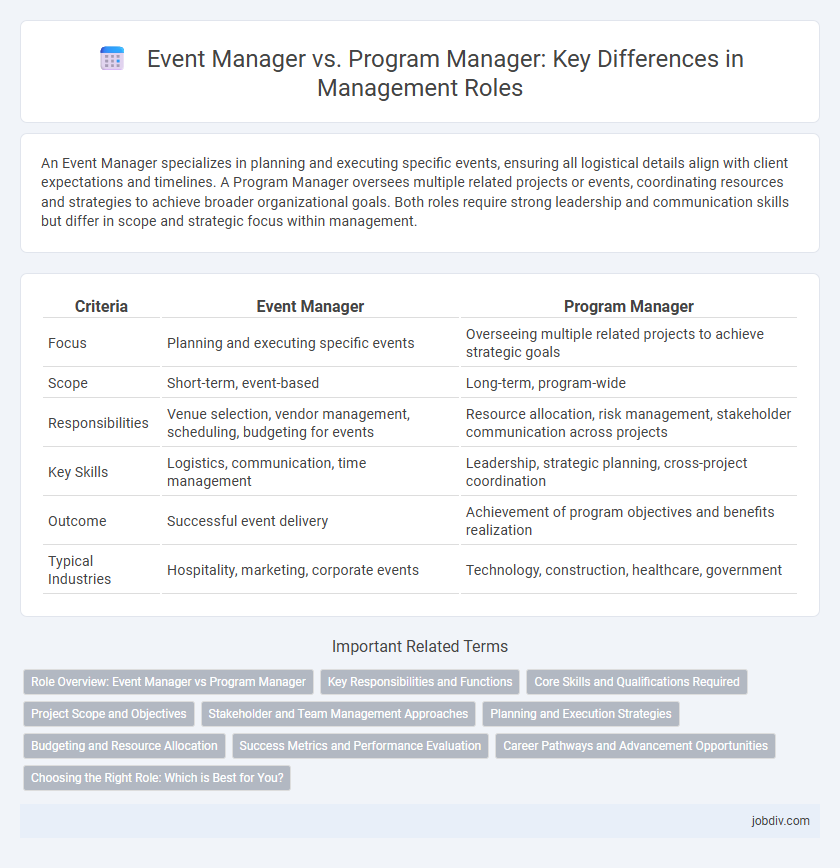An Event Manager specializes in planning and executing specific events, ensuring all logistical details align with client expectations and timelines. A Program Manager oversees multiple related projects or events, coordinating resources and strategies to achieve broader organizational goals. Both roles require strong leadership and communication skills but differ in scope and strategic focus within management.
Table of Comparison
| Criteria | Event Manager | Program Manager |
|---|---|---|
| Focus | Planning and executing specific events | Overseeing multiple related projects to achieve strategic goals |
| Scope | Short-term, event-based | Long-term, program-wide |
| Responsibilities | Venue selection, vendor management, scheduling, budgeting for events | Resource allocation, risk management, stakeholder communication across projects |
| Key Skills | Logistics, communication, time management | Leadership, strategic planning, cross-project coordination |
| Outcome | Successful event delivery | Achievement of program objectives and benefits realization |
| Typical Industries | Hospitality, marketing, corporate events | Technology, construction, healthcare, government |
Role Overview: Event Manager vs Program Manager
Event Managers specialize in planning, organizing, and executing specific events, handling logistics such as venue selection, vendor coordination, and real-time event management to ensure seamless delivery. Program Managers oversee multiple related projects or events, focusing on overarching strategy, resource allocation, and alignment with organizational goals to drive long-term program success. The Event Manager's role is tactical and execution-focused, while the Program Manager's role is strategic and coordination-centric across various initiatives.
Key Responsibilities and Functions
An Event Manager coordinates the logistics, vendor relations, and on-site execution of specific events, ensuring seamless experiences aligned with client goals. In contrast, a Program Manager oversees multiple related projects, aligning their outcomes with broader organizational objectives through strategic planning, resource allocation, and cross-functional team leadership. Both roles require strong communication skills, but Event Managers emphasize real-time operational management, while Program Managers focus on long-term program success and performance tracking.
Core Skills and Qualifications Required
Event Managers excel in logistics coordination, vendor negotiation, and on-site problem solving, requiring strong organizational skills, attention to detail, and expertise in event technology platforms. Program Managers demonstrate proficiency in strategic planning, cross-functional team leadership, and risk management, with qualifications emphasizing project management certifications such as PMP or PgMP, and experience in budget oversight and stakeholder communication. Both roles demand excellent interpersonal skills, but Event Managers focus more on operational execution, whereas Program Managers prioritize program alignment with organizational goals.
Project Scope and Objectives
Event managers concentrate on organizing and executing specific events with clear, time-bound objectives and well-defined deliverables, focused on logistics, attendee experience, and vendor coordination. Program managers oversee multiple related projects aligned under a broader strategic scope, ensuring objectives contribute to long-term organizational goals and optimizing resource allocation across projects. The scope for event managers is typically narrow and tactical, while program managers handle extensive, interconnected project scopes with a focus on governance and outcome integration.
Stakeholder and Team Management Approaches
Event Managers excel in managing short-term, high-intensity projects by coordinating vendors, clients, and on-site teams to ensure seamless event execution. Program Managers oversee multiple related projects, aligning diverse teams and stakeholders across departments to achieve long-term strategic goals. Effective stakeholder communication in event management is often immediate and tactical, while program management requires ongoing relationship building and cross-functional collaboration.
Planning and Execution Strategies
Event Managers specialize in detailed logistics planning and real-time execution, ensuring seamless coordination of venues, vendors, and attendee experiences. Program Managers oversee multiple related projects, integrating strategic planning with resource allocation and risk management to achieve broader organizational goals. Their planning and execution strategies differ by scope, with Event Managers focusing on individual event success and Program Managers driving long-term program outcomes.
Budgeting and Resource Allocation
Event Managers focus on detailed budgeting and resource allocation for individual events, ensuring costs align with specific event goals and timelines. Program Managers oversee broader resource distribution across multiple projects or events, optimizing budget use to achieve strategic organizational objectives. Effective collaboration between both roles maximizes financial efficiency and resource utilization within the management framework.
Success Metrics and Performance Evaluation
Event Managers are assessed primarily on metrics such as attendee satisfaction, event attendance numbers, budget adherence, and logistical execution quality. Program Managers focus on long-term success indicators including project completion rates, cross-team collaboration effectiveness, and alignment with strategic business objectives. Performance evaluation for Event Managers emphasizes immediate deliverables and operational efficiency, while Program Managers are evaluated on sustained impact and program scalability.
Career Pathways and Advancement Opportunities
Event Managers typically advance by gaining expertise in logistics and client relations, often transitioning into senior event coordination or vendor management roles within corporate or agency settings. Program Managers progress through roles emphasizing strategic oversight, cross-functional team leadership, and budget management, moving towards senior program director or portfolio management positions in larger organizations. Understanding these pathways helps professionals align skills with industry demands for targeted career growth in management.
Choosing the Right Role: Which is Best for You?
Choosing between an Event Manager and a Program Manager depends on your strengths and career goals; Event Managers excel in coordinating logistics, timelines, and vendor relationships for specific events, while Program Managers oversee multiple projects, aligning them with strategic business objectives. If you thrive in a fast-paced, detail-oriented environment focused on single-event execution, Event Management may suit you best. Conversely, if you prefer managing cross-functional teams and driving long-term initiatives, Program Management offers broader responsibility and impact.
Event Manager vs Program Manager Infographic

 jobdiv.com
jobdiv.com